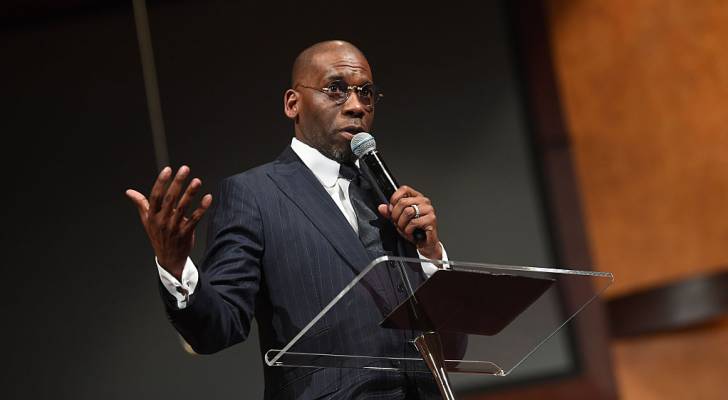
Rev. Jamal Bryant, pastor at one of the largest megachurches in Atlanta, is urging his congregants and like-minded Americans to continue their weeks’-long boycott of Target.
"Not since the Montgomery Bus Boycott has Black America come together in such a unified vision, a unified focus and a unified front," Bryant said.
Don’t miss
- I’m 49 years old and have nothing saved for retirement — what should I do? Don’t panic. Here are 5 of the easiest ways you can catch up (and fast)
- Thanks to Jeff Bezos, you can now become a landlord for as little as $100 — and no, you don’t have to deal with tenants or fix freezers. Here’s how
- Gain potential quarterly income through this $1B private real estate fund — even if you’re not a millionaire. Here’s how to get started with as little as $10
Bryant kicked off the boycott — originally a 40-day shopping ‘fast’ — at the beginning of Lent, on March 5.
He launched the boycott to protest Target’s decision to roll back DEI initiatives, announced in January. Other faith leaders supported the effort and 20,000 people signed up.
At Easter, he told his congregants at New Birth Missionary Baptist Church that their boycott had cost Target $12 billion, and encouraged them to keep it up beyond Easter until the company restored its DEI efforts.
Now, as Fox 5 reports, he says it’s time for the fast to shift into a “full-on boycott.”
Here’s a look at how much the pastor’s initiative — and similar boycotts — are affecting Target’s bottom line and its DEI policies.
Megachurch pastor says Target must meet demands
Bryant has a significant profile as the head of a megachurch and a celebrity who once appeared on The Real Housewives of Potomac with his ex-wife Gizelle Bryant.
He has used his influence to issue demands that Target must comply with for the boycott to end. Bryant demands that Target:
- Renew their commitment to invest $2 billion in Black-owned businesses by July 31
- Restore internal DEI efforts
- Deposit $250 million into Black-owned banks
- Establish new partnerships with historically Black colleges and universities
Read more: Want an extra $1,300,000 when you retire? Dave Ramsey says this 7-step plan ‘works every single time’ to kill debt, get rich in America — and that ‘anyone’ can do it
According to the pastor, as of Easter, Target had only met one of these demands — committing to invest in Black-owned businesses. That’s why his megachurch continues to boycott the mega-retailer.
Bryant’s is not the only Target boycott going on. Minnesota activists launched a national boycott of Target on Feb. 1, the first day of Black History Month. The Latino Free Movement is also urging Latinos to stop shopping there.
The boycotts are changing consumer behavior in measurable ways.
The St. Louis American reports that data from two analytics firms — Placer.ai and Numerator — shows an overall decline in consumer support for Target, with Black and Hispanic households cutting their Target visits at the highest rate.
Target has lost $12.4-billion in revenue since the boycotts began and its stock has plunged by $27.27 per share. While markets have been volatile in the wake of tariffs, there is reason to believe the boycotts are having an impact.
Will efforts to stop DEI rollbacks make a difference?
The boycotts may affect Target’s bottom line, but their impact on its DEI policy is uncertain.
The Arizona Republic recently published a list of 40 businesses cutting back diversity, equity, and inclusion programs — including Amazon, AT&T, Bank of America, Disney, Ford, Google and General Motors.
They have all faced protests and boycotts, including a 24-hour economic blackout on February 28 that urged people not to spend money at any organization that had dropped its DEI initiatives.
The challenge is that all these companies, including Target, also face headwinds from President Donald Trump, who signed executive orders banning DEI in federal agencies and among federal contractors.
They may fear retaliation from Trump — through lawsuits — and counter-protests from MAGA followers opting to shop at retailers from an anti-DEI shopping list.
With boycotts blowing both ways, businesses have been left in a no-win situation with a good portion of the country likely to be upset with any DEI policies they put in place.
What to read next
- Don’t have the cash to pay Uncle Sam in 2025? You may already be eligible for a ‘streamlined’ handshake with the IRS — here’s how it works and how it can potentially save you thousands
- Here are 5 ‘must have’ items that Americans (almost) always overpay for — and very quickly regret. How many are hurting you?
- Robert Kiyosaki warns of a ‘Greater Depression’ coming to the US — with millions of Americans going poor. But he says these 2 ‘easy-money’ assets will bring in great wealth. How to get in now
This article provides information only and should not be construed as advice. It is provided without warranty of any kind.